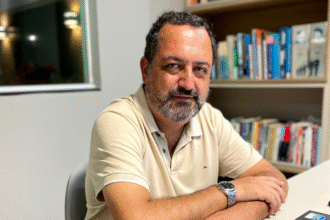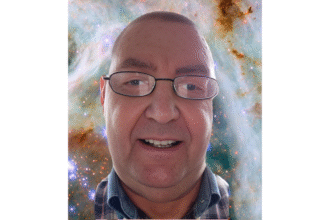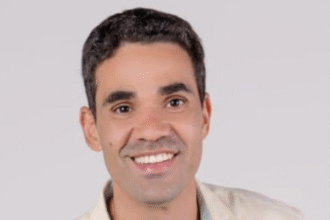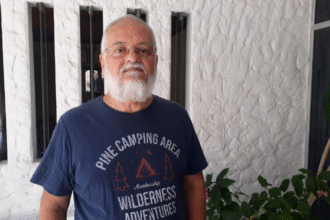Young medicine freshman Marcelo Reginato had his first contact with drugs during academic pranks in the 2000s. What started as an initial reluctance soon turned into an overwhelming addiction. In his book entitled “Changes for People Who Are Smart But Lack Wisdom,” written under the pseudonym Ricciluca Cattaneo, the author boldly recounts his journey from drug addiction and the struggle to get his life back on track.
Despite earning a medical degree and well-paying jobs, addiction increasingly consumed his existence. Gradually, Reginato lost everything, even stealing cards from his own mother to support his addiction. Amidst psychotic episodes and hallucinations, he hit rock bottom, until a moment of lucidity made him realize that he had lost his dignity.
Determined to change his trajectory, Marcelo Reginato sought help and began an arduous battle against addiction. With 15 admissions to clinics, psychiatric consultations, therapies and support groups, he finally found the path to recovery. Today, free of drugs, Reginato returns to activities in the ICUs and is recognized by the Regional Council of Medicine of São Paulo, which decorated him after proving his mental health and aptitude to practice the profession again.
In his book, the author shares important lessons about the relevance of psychiatry, psychotherapy, philosophy, family support and spirituality. His story is a true breath of hope for drug addicts and their families, highlighting the importance of seeking wisdom and self-control in the midst of adversity.
What was the inspiration behind the book “Changes for People Who Are Smart But Lack Wisdom”?
My main inspiration was former soccer player Casagrande, who publicly acknowledged his problem with drug addiction. I saw an interview with him on the Faustão program and I imagined what an experience of redemption and liberation would be like, because when we overcome a very big obstacle in life, we want to share a message of strength, faith and hope to those who still suffer from this disease. And, I must reinforce that it is a disease recognized by the World Health Organization (WHO), it is not weakness, nor deviation of character.
How was the process of writing about your own experience as a drug addict?
The idea came up during my last hospitalization, which was the longest (lasting 12 months). I needed to mature it and do it as a thesis for the conclusion of the course at the end of college, researching the subject, organizing it into chapters, and the hardest part (which I had never gone through) was really being sure and firm in the purpose of recovery . If I published the book and relapsed, I would lose all credit for achieving this work.
What were the main challenges you faced during your recovery journey?
The successive hospitalizations – which were 15 in total – made me experience what Professor Mario Sergio Cortella calls the ‘complacency of habit’. It is that seclusion from society and the pain of separation from loved ones, which have become customary. The chemical dependent has a very large elastance in relation to suffering and rock bottom gets deeper and deeper. We become spiritually empty and sentimentally anesthetized.
Inside a clinic you experience moral harassment and in some we receive restraint through physical punishment, this becomes considered normal within that context, befitting psychiatric patients who interact little socially. Relapses after a recovery process greatly affect the family, which places trust in a process that does not depend solely on the institution, but on the real desire for the addict to stop using toxic substances.

The book discusses the importance of psychiatry, psychotherapy, philosophy and family support in recovery. How did these elements contribute to your change process?
The deconstruction of the ego, the loss of self-esteem, self-love, resentment of the past, anger in the present and fear of the future are the main characteristics of the psyche of the chemically dependent person. I approach the change primarily through psychiatry, in which the psychoanalyst Flávio Gikovate developed cognitive behavioral therapies, more focused on practical and short-term solutions, changing the pattern of thought and dysfunctional behaviors, acquiring “a greater awareness” of your problem. Within psychotherapy, I mention emotional reaction therapy, developed by Albert Ellis, whose objective is to identify and challenge the individual’s dysfunctional beliefs, seeking to maintain a state of emotional balance. This new line of reasoning assumes that individuals have both innate and acquired tendencies to behave and think irrationally. My family was the core of support to overcome this obstacle, offering all the resources and unconditional support. They never gave up on me.
In addition to chemical dependency, what other topics does the book address and what message do you hope to convey to readers?
My book addresses various topics such as emotional intelligence, neurolinguistic programming, mother and child relationship, doctor and religion, happiness, among others.
The message I want to convey is one of strength, faith and hope. Show that through my steps, other people can see a light at the end of the tunnel to be able to make their own hero’s journey.
How was the process of resuming your career as a doctor after recovery? What were the difficulties and achievements in this process?
First, before being able to practice again, I had to go through a board of psychiatrists from Cremesp to test my mental health and carry out toxicological tests, then, my family did not want me to work with a long workload so as not to have mental stress that would justify the resumption of use, apart from the fact that, because I live in a small town, in the interior, my habits outside of work had repercussions, closing the doors of hospitals to work as an on-duty physician, as this process of readmissions took 10 years.
The way out was to go to the capital (São Paulo), roll up our sleeves and start from the bottom, on the outskirts, and with a clean face. My professional life took off in an unexpected way! Today I achieved my dream of working as a medical coordinator and day laborer at an ICU in a private hospital here in the capital.
How has your personal experience influenced your medical practice and your approach to patients?
I developed what healthcare managers value most today. They usually use the term “soft skills” in English, which include: empathy, creativity, proactivity, analytical capacity and problem solving. All of this comes from being more human and having compassion for others.
What role has religion played in your recovery and how does it play out in your life today?
Recovery encompasses physical, mental and spiritual health and the beginning is through spiritual. When everything is lost in life, you go in search of the word of God and there you structure yourself again. There are two possibilities in this life: either you are sacred territory, or you are wasteland. In sacred territory live Christian values (love, faith, kindness, respect, honesty, joy, humility, gratitude), this territory does not fit toxic substances, toxic friendships, character defects. My Catholic upbringing was essential to reinforce these values.
What are your hopes for those who are going through situations similar to yours? What message would you like to convey to them?
Never give up on your goals even if they seem impossible. The next attempt may be the winner, be resilient, it’s no use looking for a new path if you don’t change your way of walking.
In addition to the book, what are your future plans and projects related to awareness and help for drug addicts?
The twelfth step of Narcotics Anonymous says that if you have had a spiritual awakening, you must carry the message to those addicts who still suffer. The book gained more reach through the recommendation by psychiatrist Ronaldo Laranjeira (a reference in chemical dependency in Brazil and the world) on his Facebook page. I have participated in interviews to talk about the work and this has made me delve even deeper into the subject to bring messages of hope to other people, mainly through social networks, which are the mainstay in reaching the public today.
Follow Marcelo Reginato on Instagram





